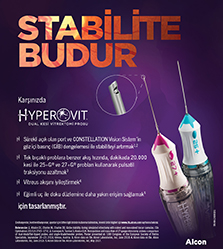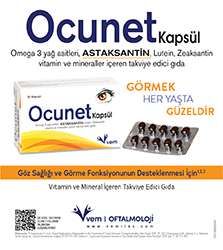Retina-Vitreous
2009 , Vol 17 , Num 3
Intravitreal Bevacizumab Therapy in Patients with Polypoidal Choroidal Vasculopathy
1İstanbul Retina Enstitüsü, İstanbul, Türkiye, Uz. Dr.2İstanbul Retina Enstitüsü, İstanbul, Türkiye, Doç. Dr.
3İstanbul Retina Enstitüsü, İstanbul, Türkiye, Prof. Dr. Purpose: To evaluate the efficacy of intravitreal bevacizumab (IVB) treatment for polypoidal choroidal vasculopathy (PCV).
Materials and Methods: In this series, 8 eyes of 8 patients with PCV were included. The patients received repeated intravitreal injections of 1.25 mg bevacizumab. Complete ocular examination, digital fluorescein angiography (FA), indocyanine green angiography, and optical coherence tomography (OCT) were performed at baseline and at standard intervals thereafter. Indications for retreatment were active leakage shown by FA, presence of subretinal fluid in OCT, and decreased visual acuity.
Results: The mean age of the patients involved was 70±11 years. The mean follow-up time was 17±8 months. The mean number of IVB injections was 4±1. At the last examination, four eyes (62%) had a decrease in vision (≥3 lines) while an improvement in vision (3 lines) was achieved in 3 eyes (38%). During the follow-up no systemic or local complications were noted.
Conclusion: Our results indicate that IVB therapy in patients with PCV seems to be ineffective. However, in view of the retrospective nature of this study, the true efficacy of IVB therapy for PCV would have to be evaluated with a larger randomized controlled trial. Keywords : Polypoidal choroidal vasculopathy, intravitreal bevacizumab therapy




